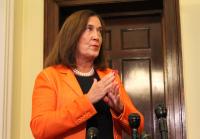November 17, 2016

The Bay State on Nov. 8 joined three other states in legalizing marijuana, bringing the national total to eight and becoming the first state on the eastern seaboard to legalize recreational marijuana. Legislative finagling may stop pot shops or cannabis cafes from popping up around Boston for the next two years, but for those 21-and-older who want to light up in the comfort of their homes or munch on a pot brownie, it’s open season in mid-December.
Approved by 54 percent of voters statewide and 62 percent of voters in Boston, the new law legalizes marijuana effective Dec. 15. It requires the forthcoming Cannabis Control Commission to begin accepting retail license applications from established medical marijuana dispensaries by Oct. 1, 2017 and from others hoping to sell marijuana and associated products by Oct. 1, 2018.
The law will permit legal private consumption of cannabis products in December and pot shops could reasonably expect to open in January 2018, leaving a legal gray zone.
But there could be a hitch in the retail timeline.
State Treasurer Deborah Goldberg, who will appoint the three commission members and will oversee the marijuana industry in Massachusetts, told reporters on Nov. 9 that she doesn’t think there should be “rigid deadlines” for the law’s implementation, according to the State House News Service.
“We really need to be reasonable. This is about the will of the people and I take that very, very seriously, but if you think about it in the context of how long, even if you’re on a private business, how long it takes to get up and running,” Goldberg said. “Some of those deadlines are pretty tough.”
She said legislative changes may be prudent to refine the law, which would likely come with a delay on approving and permitting shops that sell marijuana.
The law also allows an individual to grow up to six marijuana plants at home, provided no more than twelve are grown at any residence. Goldberg is encouraging lawmakers to lose that provision, concerned that it would damage the retail market and be difficult to enforce.
Officials who opposed the measure, like Gov. Charlie Baker and Mayor Martin Walsh, have stated they are nonetheless prepared to navigate implementation with legislators and local stakeholders.
“While the Mayor did not support the legalization of recreational marijuana,” Walsh’s office said in a prepared statement, “he respects the will of the voters and will make sure the law is implemented in a way that best serves the City of Boston and its residents.”
Senate President Stan Rosenberg, who supported the ballot measure, and House Speaker Robert DeLeo, who opposed it, have both indicated a willingness to open up the legislation for some changes, according to the news service.
Municipalities can vote by referendum to ban marijuana shops, but it is currently an opt-out model.
Boston stands in a unique position for potential inundation with pot shops, some officials say. The text of the bill “limits the number of marijuana retailers to fewer than 20 per cent of the number of licenses issued within the city or town for the retail sale of alcoholic beverages not to be drunk on the premises.”
City Councillor Michael Flaherty put forth a successful amendment to city zoning laws, approved in September 2016, which mandates a half-mile buffer zone between medical marijuana dispensaries. He told the Reporter on Wednesday that Boston’s 250 or so liquors stores would allow for up to 50 marijuana retailers in the city proper.
While “respecting the will of the voters and keeping an open mind,” Flaherty said, “it’s just up to the city to identify the more serious nuances in the ballot question from licensing and permitting to public safety and public health concerns.”
Depending on the possibly extended timeline for pot shops as Goldberg and the legislature confer, Flaherty said he expects some of the minutiae to be clarified in the coming year or two. But if the schedule rolls on as outlined in the law text, “it would make sense for Boston to amend the text amendment to include a buffer on recreational pot shots, cannabis cafes, marijuana brownie and gummy bear stores.”
Topics:


